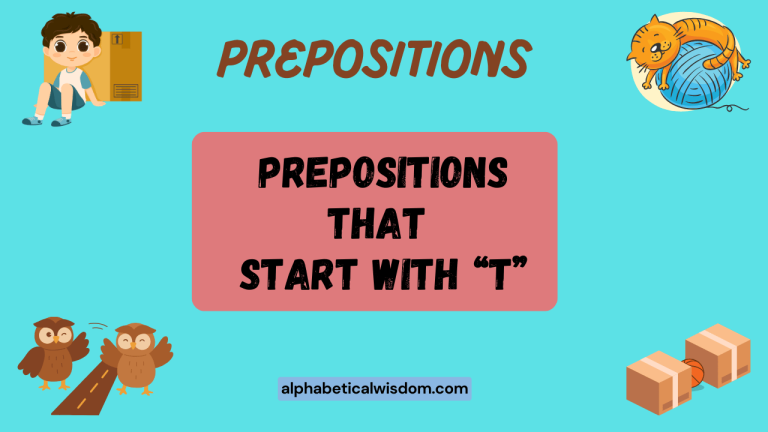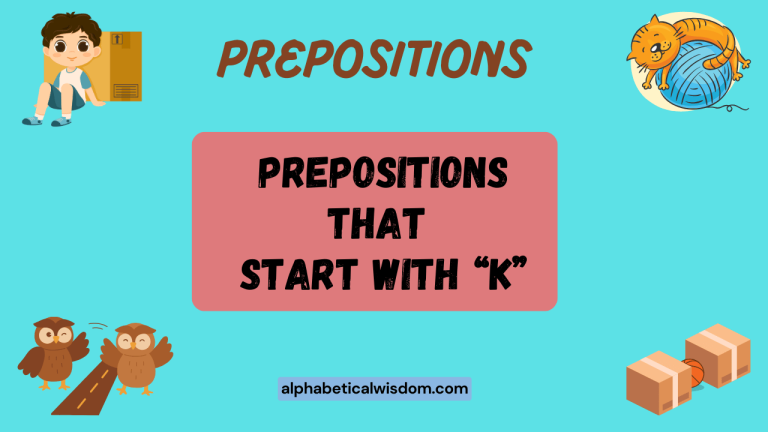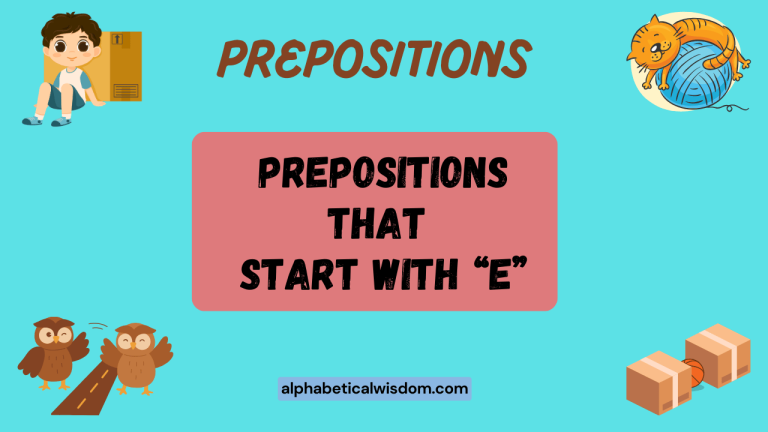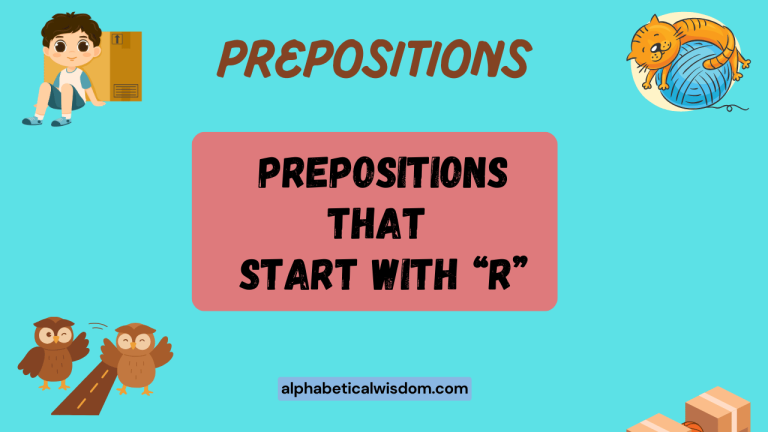Prepositions That Start With G: A Comprehensive Guide
Prepositions are essential components of English grammar, acting as bridges that connect nouns, pronouns, and phrases to other parts of a sentence. Mastering prepositions enhances clarity, precision, and fluency in both writing and speech.
While many prepositions are commonly used, those starting with the letter “G” present unique challenges and opportunities for precise expression. This article provides a comprehensive exploration of prepositions that begin with “G,” offering definitions, usage examples, common mistakes, and practice exercises to help learners of all levels improve their command of the English language.
This guide is designed for English language learners, students, teachers, and anyone looking to refine their understanding and usage of prepositions. By the end of this article, you will have a solid grasp of how to effectively use prepositions starting with “G” in various contexts, leading to more accurate and sophisticated communication.
Table of Contents
- Definition of Prepositions
- Structural Breakdown of Prepositions
- Types and Categories of Prepositions
- Examples of Prepositions Starting With G
- Usage Rules for Prepositions Starting With G
- Common Mistakes with Prepositions Starting With G
- Practice Exercises
- Advanced Topics
- Frequently Asked Questions
- Conclusion
Definition of Prepositions
A preposition is a word that connects a noun, pronoun, or noun phrase to another part of the sentence. It typically indicates the spatial, temporal, or logical relationship of the object to the rest of the sentence.
Prepositions are crucial for conveying meaning and context, providing essential information about location, direction, time, cause, and manner.
Prepositions are classified as function words, meaning they primarily serve a grammatical purpose rather than carrying substantive content. They often appear before a noun or pronoun, forming a prepositional phrase. This phrase consists of the preposition and its object, which can be a noun, pronoun, or noun phrase. The prepositional phrase then functions as an adjective or adverb, modifying other elements in the sentence.
Understanding the function and types of prepositions is fundamental to mastering English grammar. They provide the necessary links that create coherent and meaningful sentences.
Without prepositions, it would be difficult to express complex relationships between different elements in a sentence, leading to ambiguity and confusion.
Structural Breakdown of Prepositions
The structure of prepositions and prepositional phrases is relatively straightforward. A preposition typically precedes its object, forming a prepositional phrase.
This phrase can act as an adjective, modifying a noun, or as an adverb, modifying a verb, adjective, or another adverb. The basic structure is as follows:
Preposition + Object (Noun, Pronoun, or Noun Phrase) = Prepositional Phrase
For example, in the sentence “The book is on the table,” the preposition is “on,” and its object is “the table.” The entire phrase “on the table” is a prepositional phrase that functions as an adverb, modifying the verb “is” by indicating the location of the book.
Prepositional phrases can also be embedded within other phrases, creating more complex sentence structures. For instance, “The student with the highest score in the class received an award.” Here, “with the highest score in the class” is a prepositional phrase modifying “student,” and “in the class” is a prepositional phrase embedded within the larger phrase, further specifying the location of the score.
The object of a preposition can also be a gerund (a verb form ending in “-ing” that functions as a noun). For example, “She is good at singing.” In this case, “singing” is the gerund acting as the object of the preposition “at.”
Types and Categories of Prepositions
Prepositions can be categorized based on their meaning or function. Here are some common categories:
Prepositions of Location
These prepositions indicate the spatial relationship between objects or entities. Examples include: at, on, in, under, over, beside, between, among.
Prepositions of Time
These prepositions specify when an event occurs or the duration of an event. Examples include: at, on, in, before, after, during, since, until.
Prepositions of Direction
These prepositions indicate movement or direction. Examples include: to, from, into, onto, through, toward, across.
Prepositions of Agent
These prepositions indicate the cause or agent of an action. Examples include: by, with.
Prepositions of Purpose
These prepositions indicate the purpose or reason for an action. Examples include: for.
While the primary focus of this article is on prepositions starting with “G,” understanding these broader categories helps contextualize their usage within the wider scope of English grammar. The prepositions starting with “G” are more limited in number, but they still fall into some of these categories based on context.
Examples of Prepositions Starting With G
The English language has a relatively limited number of prepositions that begin with the letter “G.” The primary preposition in this category is “Given.” It is often used to express a condition, assumption, or fact that is already known or accepted. Here are some examples of how “Given” is used in various contexts.
Examples of “Given” as a Preposition
The following table provides examples of “Given” used as a preposition, showcasing its versatility in different sentence structures and contexts. Each example illustrates how “Given” introduces a known fact or assumption that influences the rest of the sentence.
| # | Example Sentence | Explanation |
|---|---|---|
| 1 | Given the circumstances, we had no other choice. | “Given the circumstances” introduces the context that influenced the decision. |
| 2 | Given his expertise, he was the best candidate for the job. | “Given his expertise” highlights a known fact about the candidate’s qualifications. |
| 3 | Given the weather forecast, we decided to stay indoors. | “Given the weather forecast” provides the reason for staying inside. |
| 4 | Given the evidence, the jury reached a guilty verdict. | “Given the evidence” indicates the basis for the jury’s decision. |
| 5 | Given her age, she is remarkably active. | “Given her age” acknowledges a fact that makes her activity level surprising. |
| 6 | Given the limited resources, the team performed exceptionally well. | “Given the limited resources” explains the challenging conditions under which the team worked. |
| 7 | Given the opportunity, I would travel the world. | “Given the opportunity” expresses a hypothetical condition for traveling. |
| 8 | Given the current market trends, investing in technology stocks seems promising. | “Given the current market trends” provides the basis for the investment decision. |
| 9 | Given all the information, what is your conclusion? | “Given all the information” prompts a conclusion based on provided data. |
| 10 | Given the complexity of the task, it will take several weeks to complete. | “Given the complexity of the task” explains the estimated completion time. |
| 11 | Given the high demand, prices are likely to increase. | “Given the high demand” explains the expected price increase. |
| 12 | Given the lack of funding, the project has been put on hold. | “Given the lack of funding” provides the reason for the project’s suspension. |
| 13 | Given the circumstances, it’s understandable why he reacted that way. | “Given the circumstances” helps explain his reaction. |
| 14 | Given the short notice, we did our best to prepare. | “Given the short notice” sets the context for their preparation efforts. |
| 15 | Given the traffic, we should leave early to arrive on time. | “Given the traffic” provides the reason for leaving early. |
| 16 | Given all that has happened, it’s hard to remain optimistic. | “Given all that has happened” explains why it is difficult to be optimistic. |
| 17 | Given the choice, I’d prefer to work from home. | “Given the choice” introduces a hypothetical scenario. |
| 18 | Given the potential risks, we need to proceed with caution. | “Given the potential risks” highlights the need for caution. |
| 19 | Given the success of the pilot program, we’ll expand it nationwide. | “Given the success of the pilot program” justifies the expansion. |
| 20 | Given the high cost of living, many people struggle to save money. | “Given the high cost of living” explains the difficulty in saving money. |
| 21 | Given the popularity of the author, the book is expected to be a bestseller. | “Given the popularity of the author” suggests why the book will be a bestseller. |
| 22 | Given the historical context, the decision makes sense. | “Given the historical context” helps explain the decision. |
| 23 | Given the widespread use of technology, digital literacy is essential. | “Given the widespread use of technology” explains the importance of digital literacy. |
| 24 | Given the increasing global population, sustainable practices are crucial. | “Given the increasing global population” highlights the importance of sustainable practices. |
| 25 | Given the complexity of the problem, a simple solution is unlikely. | “Given the complexity of the problem” suggests why a simple solution won’t work. |
As demonstrated in the table above, “Given” is a versatile preposition that adds context and provides a basis for understanding or decision-making in various situations.
While “Given” is the most common, it’s important to note that other words starting with “G” may function as prepositions in specific idiomatic expressions or less conventional constructions. However, these are rare and typically function as parts of phrasal verbs or other grammatical structures rather than standalone prepositions.
Usage Rules for Prepositions Starting With G
The primary usage rule for “Given” as a preposition is that it should introduce a fact, condition, or assumption that is already known or accepted. It sets the stage for the rest of the sentence by providing a context that influences the outcome or decision being described.
Rule 1: Introduce Known Information
“Given” should always introduce information that is assumed to be true or already known to the audience. This ensures that the context provided by “Given” is relevant and understandable.
Rule 2: Followed by a Noun Phrase
“Given” is typically followed by a noun phrase that specifies the condition or fact being considered. This noun phrase should be clear and concise, accurately representing the information it is intended to convey.
Rule 3: Proper Placement in Sentence
“Given” is usually placed at the beginning of a sentence or clause to set the context before the main statement. This placement helps to establish the relationship between the known information and the subsequent outcome or decision.
Rule 4: Avoid Redundancy
Avoid using “Given” in situations where the information is already obvious or redundant. The purpose of “Given” is to provide relevant context, so it should be used judiciously to enhance clarity and understanding.
Exceptions and Special Cases
While “Given” primarily functions as a preposition in the sense described above, it can also be used as a past participle of the verb “give.” In this case, it functions as an adjective, meaning “bestowed” or “presented.”
Example: “Given the award for his outstanding achievements, he delivered an inspiring speech.”
In this sentence, “Given” is part of the participial phrase “Given the award,” which modifies “he.” It does not function as a preposition in this context.
Common Mistakes with Prepositions Starting With G
While “Given” is relatively straightforward, some common mistakes can occur when using it as a preposition. These mistakes typically involve misusing the context, incorrect placement, or redundancy.
Mistake 1: Unclear Context
Using “Given” to introduce information that is not clearly understood or accepted can lead to confusion. The context provided by “Given” should be easily recognizable and relevant to the audience.
Incorrect: Given the quantum entanglement, the results were predictable.
Correct: Given the established scientific principles, the results were predictable.
In the incorrect example, “quantum entanglement” may not be a universally understood concept, making the context unclear. The corrected example uses “established scientific principles,” which provides a more accessible context.
Mistake 2: Incorrect Placement
Placing “Given” in the middle of a sentence without proper context can disrupt the flow and make the sentence awkward. “Given” should typically be placed at the beginning of a sentence or clause.
Incorrect: The project, given the limited resources, was completed successfully.
Correct: Given the limited resources, the project was completed successfully.
In the incorrect example, the placement of “Given” disrupts the sentence structure. The corrected example places “Given” at the beginning, providing a clear context for the successful completion of the project.
Mistake 3: Redundancy
Using “Given” to introduce information that is already obvious or implied can make the sentence redundant and unnecessary. “Given” should be used to provide relevant context, not to state the obvious.
Incorrect: Given the fact that it was raining, the ground was wet.
Correct: Because it was raining, the ground was wet.
In the incorrect example, the fact that the ground is wet when it rains is obvious, making the use of “Given” redundant. The corrected example uses “Because” to provide a more concise and direct explanation.
Mistake 4: Misunderstanding the Function
Confusing the prepositional use of “Given” with its use as a past participle can lead to grammatical errors. Ensure that “Given” is used correctly based on its intended function in the sentence.
Incorrect: Given the task to him, he completed it efficiently.
Correct: Having been given the task, he completed it efficiently.
In the incorrect example, “Given” is misused as a preposition when it should be used as part of a participial phrase. The corrected example uses “Having been given” to accurately reflect the sequence of events.
Practice Exercises
Test your understanding of prepositions starting with “G” by completing the following exercises. Choose the correct preposition or rewrite the sentence to use “Given” appropriately.
Exercise 1: Fill in the Blanks
Complete the following sentences using “Given” appropriately.
| # | Question | Answer |
|---|---|---|
| 1 | _____ the circumstances, what would you do? | Given |
| 2 | _____ his track record, he is likely to succeed. | Given |
| 3 | _____ the opportunity, I would travel to Japan. | Given |
| 4 | _____ the information available, make a decision. | Given |
| 5 | _____ the limited time, we need to prioritize tasks. | Given |
| 6 | _____ the weather, we should postpone the picnic. | Given |
| 7 | _____ the evidence, the case seems clear. | Given |
| 8 | _____ the resources, the project can be completed. | Given |
| 9 | _____ the situation, we must act quickly. | Given |
| 10 | _____ the circumstances, I understand your decision. | Given |
Exercise 2: Error Correction
Identify and correct the errors in the following sentences related to the use of “Given.”
| # | Incorrect Sentence | Corrected Sentence |
|---|---|---|
| 1 | The results, given the experiment, were surprising. | Given the experiment, the results were surprising. |
| 2 | Given the fact that it was sunny, the sky was blue. | Because it was sunny, the sky was blue. |
| 3 | Given him the task, he completed it quickly. | Having been given the task, he completed it quickly. |
| 4 | Given the quantum physics, the explanation is complex. | Given the principles of quantum physics, the explanation is complex. |
| 5 | The success, given the hard work, was well-deserved. | Given the hard work, the success was well-deserved. |
| 6 | Given it was raining, we took an umbrella. | Given that it was raining, we took an umbrella. |
| 7 | Given her, she is very talented. | Given her background, she is very talented. |
| 8 | The decision, given the circumstances, was difficult. | Given the circumstances, the decision was difficult. |
| 9 | Given the climate change, the weather is unpredictable. | Given the effects of climate change, the weather is unpredictable. |
| 10 | Given he is young, he is surprisingly mature. | Given his age, he is surprisingly mature. |
Exercise 3: Sentence Completion
Complete the following sentences using “Given” and providing a logical continuation.
| # | Incomplete Sentence | Possible Completion |
|---|---|---|
| 1 | Given the short deadline,… | …we need to work efficiently. |
| 2 | Given the complexity of the problem,… | …we need a team of experts. |
| 3 | Given the high demand for the product,… | …we are increasing production. |
| 4 | Given the current economic climate,… | …investments should be made cautiously. |
| 5 | Given the lack of experience,… | …training will be provided. |
| 6 | Given the available resources,… | …we can achieve our goals. |
| 7 | Given the potential risks involved,… | …we need to proceed with caution. |
| 8 | Given the importance of the project,… | …we must allocate sufficient resources. |
| 9 | Given the positive feedback,… | …we will continue with the same approach. |
| 10 | Given the limited budget,… | …we need to find cost-effective solutions. |
Advanced Topics
For advanced learners, understanding the nuances of prepositions like “Given” can further enhance their command of the English language. This includes recognizing subtle variations in meaning and usage, as well as exploring the historical development of these words.
Subtle Variations in Meaning
The meaning of “Given” can vary slightly depending on the context and the specific noun phrase it introduces. For example, “Given the circumstances” implies a broad consideration of all relevant factors, while “Given the evidence” focuses specifically on factual information.
Historical Development
The use of “Given” as a preposition has evolved over time, reflecting changes in the English language and shifts in cultural and intellectual perspectives. Tracing the historical development of “Given” can provide insights into its current usage and meaning.
“Given” in Formal Writing
In formal writing, “Given” is often used to introduce assumptions or premises in logical arguments or academic discussions. This usage reflects the word’s ability to provide a clear and concise context for complex ideas.
Frequently Asked Questions
Here are some frequently asked questions about prepositions starting with “G,” specifically focusing on “Given.”
- Is “Given” always a preposition?
No, “Given” can also function as a past participle, especially when used as part of a participial phrase. It is essential to understand the context to determine its function. For example: “Given the award…” (participle) versus “Given the circumstances…” (preposition). - Can “Given” be used interchangeably with “Because”?
While both “Given” and “Because” can introduce a reason or explanation, they are not always interchangeable. “Given” introduces a known fact or assumption, while “Because” introduces a direct cause-and-effect relationship. For example: “Given the rain, we stayed inside” (context) versus “Because it was raining, we stayed inside” (cause). - What is the difference between “Given” and “Considering”?
Both “Given” and “Considering” introduce a context or condition, but “Considering” often implies a more active process of deliberation or evaluation. “Given” presents a fact as already known, while “Considering” suggests a more thoughtful analysis. For example: “Given his experience, he is qualified” (fact) versus “Considering his experience, we should hire him” (evaluation). - How do I avoid misusing “Given” in my writing?
To avoid misusing “Given,” ensure that the context you are introducing is clear, relevant, and already known to your audience. Avoid redundancy and use “Given” at the beginning of a sentence or clause for clarity. - Are there any other words starting with “G” that function as prepositions?
While “Given” is the primary preposition starting with “G,” other words may function as prepositions in specific idiomatic expressions or phrasal verbs. However, these are rare and typically function as parts of larger grammatical structures. - Can “Given” be used in informal speech?
Yes, “Given” can be used in both formal and informal speech, but it is more common in formal writing and speech due to its precise and logical nature. In informal contexts, simpler alternatives like “Because” or “Since” may be preferred. - What are some common phrases that use “Given”?
Some common phrases that use “Given” include “Given the circumstances,” “Given the opportunity,” “Given the evidence,” and “Given the information.” These phrases are used to introduce a context or condition that influences the subsequent statement. - How does the use of “Given” affect the tone of a sentence?
Using “Given” can add a tone of formality and logical reasoning to a sentence. It suggests that the statement is based on a rational assessment of known facts or conditions, making the sentence more persuasive and authoritative. - Can I use “Given” in questions?
Yes, “Given” can be used in questions to prompt a response based on a known context. For example: “Given the current situation, what steps should we take?” This usage invites a thoughtful and informed response. - Is “Given that” the same as “Given”?
“Given that” and “Given” are very similar and often interchangeable. “Given that” explicitly introduces a clause, while “Given” is followed by a noun phrase. For example: “Given the rain…” versus “Given that it is raining…” Both serve to provide context.
Conclusion
Mastering prepositions, including those starting with “G,” is crucial for effective communication in English. This article has provided a comprehensive overview of the preposition “Given,” including its definition, usage rules, common mistakes, and practice exercises.
By understanding how to use “Given” correctly, learners can enhance their clarity, precision, and fluency in both writing and speech.
Remember to practice using “Given” in various contexts to solidify your understanding and avoid common mistakes. Pay attention to the context, placement, and potential for redundancy to ensure that your usage is accurate and effective.
With consistent effort and attention to detail, you can confidently incorporate “Given” into your vocabulary and improve your overall command of the English language.
Continue to explore the nuances of English grammar and expand your knowledge of prepositions. The more you learn, the more effectively you will be able to express yourself and communicate with clarity and confidence.






